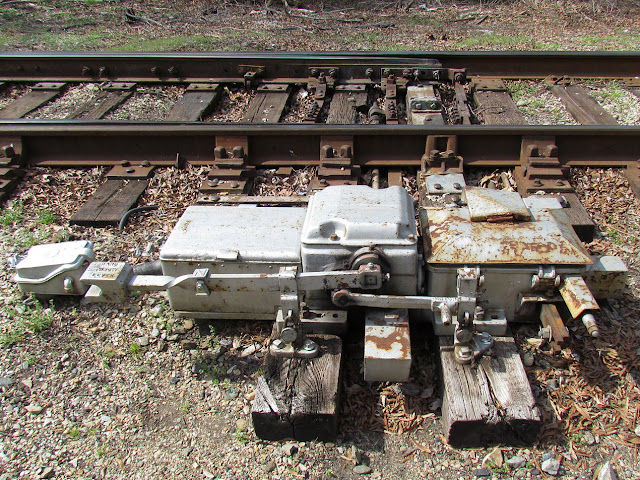The Union Switch and Signal M3 series of switch machines (including the M3, M23 and A and B models of both) is so ubiquitous and has been around for so long that one might assume the model spring fully formed from the head of George Westinghouse. However it is important to remember that the "M" is the family, not M3 and unlike General Railway Signal, where their switch machines Models 1 through 4 were radically different than the Model 5, the US&S Style M has remained fairly consistent since its introduction in 1918. In fact one of the reasons its easy to assume that the M3 (or M23) has been around far longer than its actual introduction date of 1951, is because the M22 is similar enough that both times I encountered one in the wild, I only noticed the machine was actually an M22 when I was performing unrelated photo research years later.
To review, above is an US&S M23 switch machine as previously installed on the former C&O Washington Sub near Charlottesville, VA. Below is an M22 switch machine as previously installed about 10 miles to the east in Gordonsville, VA.
I'm not going to go into all the technical details as to how they differ, there's already a page for that, but the big giveaway for an M22 vs an M23 is the non-concentric selector lever that swaps the machine between manual and power operation. The second giveaway is the bolt pattern on the top of the central gearbox with the M23 having 2 large bolts and the M2 4 smaller bolts and a more bulbous cover. Unfortunately I have yet to encounter an M2 in the wild and from the few photos online I cannot determine an easy way to differentiate it from an M3. Anyway, these and any other M22's along the former C&O Cardinal Route (now operated by the Buckingham Branch shortline) were removed in a 2013/2014 re-signaling project. However there is another M22 I just discovered situated about 5 feet from a busy public right of way.
It's this fellow, the northern end of the #1 crossover at CP-ASH in sunny downtown San Diego. In fact its directly adjacent to the Little Italy light rail station.
Although my photo is from 2015, a quick check of Google Street View shows that it is still in place as of October, 2022.
So if you happen to be in San Diego or out and around some rail line that hasn't seen a switch replacement since 1951, know how to spot an M22 and make sure you take plenty of photos if you come across one.






























